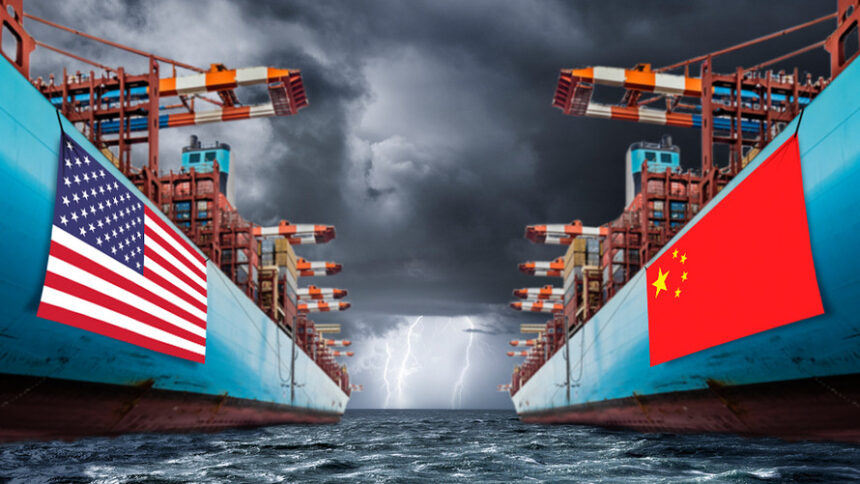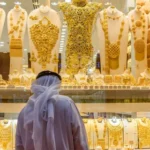US President Donald Trump’s latest tariff war is shaping up to be far more challenging than his previous attempts, as economists point out the mounting pressure on US assets and the volatility in global capital markets. The uncertainty surrounding US trade policies, coupled with market jitters, is forcing Washington to reconsider its stance on tariffs, with some experts predicting that a quick victory is unlikely.
Intensified US – China Tariff Dispute
Trump’s recent tariffs, particularly on China, are at the forefront of the global economic tensions. The president has imposed a 145% tariff rate on Chinese goods entering the US, to which Beijing has retaliated with an 84% tariff on US exports.
Additionally, Trump’s aggressive trade policy extends beyond China, with hefty duties levied on US allies in the European Union and other Asian economies, triggering concerns about a global trade slowdown.
The impact on capital markets has been profound, with the US benchmark index experiencing a sharp correction, losing over $6 trillion in just two days following Trump’s announcement of the “liberation day” tariffs in April.
Read More: Asia-Pacific Stocks Trade Mixed as Investors Monitor US Trade Talks, Dollar Strength
Economist Warns of an Uncertainty
Sergei Guriev, Dean of the London Business School, explained at the third Capital Market Summit in Dubai that the tariff war is unlikely to be the easy win that some predicted. He also added that, unlike the first round of Trump’s trade policies, the economic environment today is vastly different.
According to Guriev, the US administration is feeling the pressure from the market’s volatility and the financial losses faced by its allies. As a result, there is a possibility that Washington will backtrack on some of its more aggressive policy positions.
“My optimistic angle is this administration seems to be sensitive to markets when it sees that people who are friends with administrations are losing money,” Guriev said. “When they see that capital markets, bond markets are nervous, they sometimes walk back.”
Global Economic Uncertainty and New Alliances
One of the most significant risks of this ongoing trade war is the extreme policy uncertainty coming from Washington. Economists warn that this instability is pushing other nations to form new alliances, particularly neutral countries like the UAE, which are seizing opportunities to open new trade channels.
Rajeev Sibal, Senior Global Economist at Morgan Stanley, noted that the UAE is taking a more measured approach, focusing on its strategic location for trade and forging new trade agreements. The UAE has negotiated several Comprehensive Economic Partnership Agreements (CEPAs), which have created new opportunities for international trade. This approach, according to Sibal, has positioned the UAE as a key player in the evolving global trade environment.
“The UAE is strategically placed to benefit from these shifting trade dynamics,” Sibal explained. “New trade routes are emerging, and the country is well-positioned to capitalize on these opportunities through its flexible policy framework.”
Also Read: Trump’s Tariff Chaos Forces European Auto Giants to Ditch Financial Guidance
UAE Resilience Among Global Economic Pressure
Despite the challenges posed by external economic pressures, the UAE and Dubai have shown resilience. According to Simon Williams, Chief Economist for CEEMEA at HSBC Middle East, the UAE has undergone significant structural reforms over the past five years, making it well-prepared for growth even in the face of global shocks.
Williams, along with Guriev, advised that neutral countries like the UAE should continue to foster trade with both the East and West, benefiting from investments and trade partnerships across the globe. By maintaining an open and adaptive trade policy, these nations are well-positioned to weather the storm of rising tariffs and trade tensions.
“The UAE, and Dubai in particular, are prime candidates to become the global trade hub in this new landscape,” Guriev said. “With tariffs potentially set at 10% for most nations and 60% for China, the UAE is poised to attract trade and investment from both sides, positioning itself as a neutral ground for international commerce.”
Uncertainty in US Dollar Assets and Global Capital Markets
As the trade war escalates, the implications for global capital markets and US dollar assets remain uncertain. The volatility in these markets has raised questions about the security of US dollar-denominated assets, with Guriev warning of increased dollar fluctuations as trade-related uncertainty persists. For investors, this presents a new challenge in navigating the shifting landscape of global trade and capital flows.
Conclusion
Ultimately, economists suggest that while the current situation is complex, it also presents unique opportunities for countries like the UAE that are prepared to adapt to a changing global economy. By positioning themselves as neutral hubs for trade and investment, countries in the Middle East are positioning themselves to thrive despite the ongoing challenges of the US-China trade war.
Read more business news on 10X Times.






